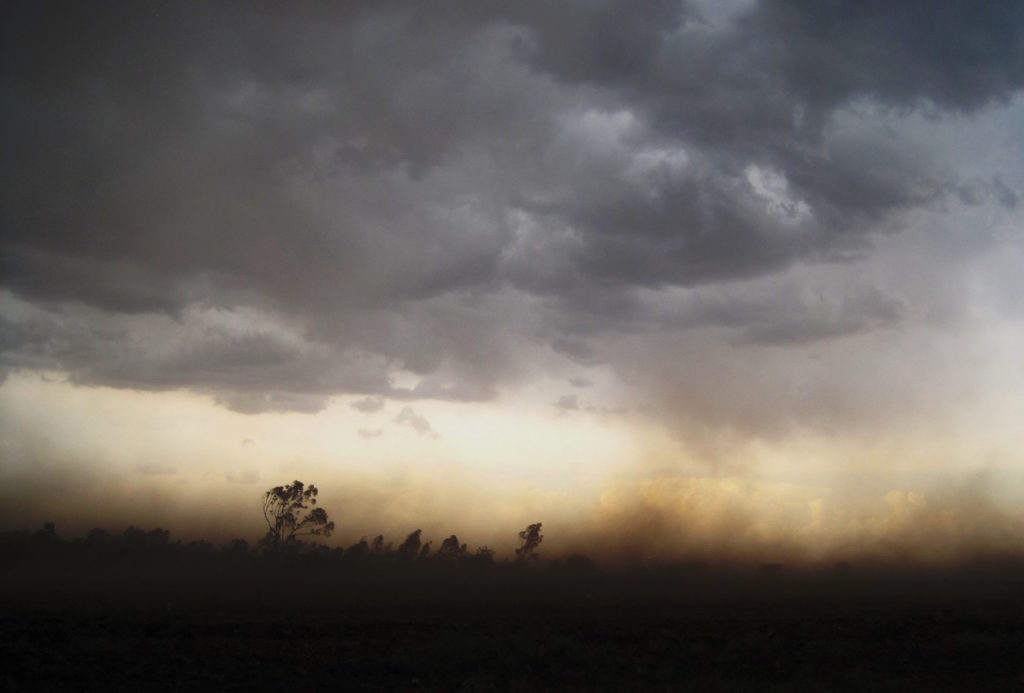In a recent Public Discourse essay, Casey Chalk highlights the perils of libertarian atomism. Through an analysis of the Dust Bowl, Chalk shows that any ideology that posits man as a solitary figure, needing nothing from his fellow men to survive or flourish, gives a false understanding of the human person.
Chalk is absolutely correct in his argument that the Dust Bowl is a powerful refutation of the stubbornly persistent falsehood that each man is an island rather than a creature lovingly made for cooperation and mutual support. However, Chalk errs in arguing that government programs to help farmers are proof that anthropological atomism is bad ideology.
In fact, anthropological atomism and the federal Leviathan are both outgrowths of the same fundamental falsehood: political liberalism, which leads first to atomism and then to statism. The fairy tale of the “social contract”—based on an understanding of man as a sovereign, totally independent individual who freely chooses each of his responsibilities and relationships—is obviously untenable. In the end, it requires an uber-sovereign able to bend all the other sovereigns to its will. The federal government is the inevitable statist response to libertarian ideology. It is not atomism’s antithesis, but its culmination.
The real alternative to the ideology of radical self-sufficiency is not reliance on the state, but the kind of community-based brotherly love and mutual aid that could be found even during midwestern American farmers’ darkest days. John Steinbeck’s Dust Bowl epic, The Grapes of Wrath—a book Chalk mentions in his essay—is a good example of the milk of human kindness flowing from one person to another in hard times. In the end, neither individuals nor governments, but communities, are the real vehicles for peace, harmony, and human flourishing.
Start your day with Public Discourse
Sign up and get our daily essays sent straight to your inbox.What Was the Dust Bowl?
The Dust Bowl was, indeed, a disaster. Central and western American states were thoughtlessly plowed under in the early decades of the twentieth century. This wrecked the local environment and produced massive clouds of dust as the thin prairie topsoil, deprived of the grasses that anchored and protected it, dried up and blew away. Drought followed, crops failed, the ecosystem unraveled, and animal life (including humans) had no choice but to flee the scene of the unfolding catastrophe.
Why did people do such a foolish thing? When governments began to wage senseless war in Europe in 1914, there was an increased demand for agricultural products to feed the Allied war machine and help make up for arable land lost to fighting. “Capitalist carpetbaggers,” whom Chalk rightly describes as having taken advantage of cheap land prices and soaring wartime demand for foodstuffs, began farming with no knowledge of best agricultural practices. These opportunistic predators put into practice Theodore Roosevelt’s “New Nationalism” and Woodrow Wilson’s extension of that muscular statism—enthusiastically funded by East Coast bankers—to a far-off and pointless conflict in World War I. Much earlier, too—such as after the Homestead Act of 1862—the US government had been encouraging people to plow under the prairies. Without the reckless actions of the federal government in a myriad of areas, there would have been no Dust Bowl.
In other words, the synthesis of atomism and statism in imperialism spun off a government-fueled commodities bubble, which in turn led to irresponsible speculators’ rushing headlong into farming, transforming a way of life into a way to get rich quick. The result was a prolonged ecological nightmare and a refugee crisis that, in many cases, permanently displaced those who had been farming the harsh prairie for generations. Given this, it is difficult to fault the farmers for their longstanding suspicion of both governments and Wall Street.
Imperialism as Antithetical to Traditional, Agrarian Communities
In its Jeffersonian adolescence, the United States had been a nation of small farms and local traditions, like those found in the Midwest before the run-up to the Dust Bowl. But liberalism transformed the agrarian republic into a Hamiltonian Mr. Hyde, an imperialist power parasitic on local producers and forever going abroad in search of monsters to destroy.
Chalk seems to take satisfaction in farmers’ having been disabused of their individualistic leanings by the humiliation of having to beg for government relief. In truth, “capitalistic carpetbaggers,” and the Hobbesian-imperialist state that emboldened them, were far better students of the atomistic, libertarian ideology, whose comeuppance I join Chalk in celebrating, than the farmers ever were.
Unlike upstart speculators and government agents, those whose vocation is farming make their living off the land, and they tend to act in view of long-term consequences. No farmer who wants to remain in business ten or twenty years hence will destroy the source of his livelihood by recklessly mutilating the natural environment. Farmers know all too well that governments, by contrast, rarely do more than react to whatever crisis their policies have engendered, compounding error with further shortsightedness. Likewise, when short-term profit has been exhausted in a particular location, speculators (including corporations driven by spreadsheet logic) simply decamp and move on to the next bubble. This is a recipe for chaos, but it is hardly attributable to farmers or their traditional insistence on refusing to get caught up in outsiders’ schemes.
Deneen’s Catch-22 of Statism
Chalk sees the government’s relief programs for Dust Bowl refugees as proof that libertarian ideology is false. But this line of reasoning strikes only a glancing blow at the problem. Yes, the government set up relief programs for farmers. But Chalk errs in appealing to the aid programs of Leviathan as proof for the more robust anthropology he proffers. That the federal government later extended to farmers a helping hand to solve the problems it helped create in the first place is a classic example of the “statist Band-Aids” that Patrick Deneen derides in Why Liberalism Failed.
As Chalk writes:
Plains farmers—described by historian Donald Worster as “a group of people who are very anti-state, anti-government, who never wanted the government interfering in anything they did”—began petitioning the federal government for assistance. Some sought civil permission to condemn other people’s property if they weren’t keeping it up—a “very authoritarian measure for folks who consider themselves highly individualistic,” observes journalist Timothy Egan. Others would later propose martial law across the plains. […] Historically Republican-leaning counties across the prairies voted for FDR in the 1932 presidential election in the hopes of securing relief. The newly-elected president responded to their cries for help within his first one hundred days in office. […] Federal employees traveled the Plains, teaching farmers better farming methods.
This passage is a perfect illustration of Deneen’s observation that statism destroys communities and then sets itself up as the remedy for the ills that follow upon community’s demise. Rain may not follow the plow, but statism follows liberalism like night follows day.
The truth is that it was anti-traditional, unsustainable “New Nationalism” that underwrote the wild stock market speculation that led to the crash of 1929 and the decade of mass unemployment that followed. Earlier warmongering and imperialism in the 1910s (“making the world safe for democracy”) necessitated the hasty and ill-conceived plowing under of millions of acres of delicate prairieland, which brought catastrophic environmental devastation in its wake. And the state-backed corrosion of communities during the “Gilded Age” of Wall Street depredation unleashed armies of novices to take advantage of the wartime boom by going into the middle of the continent and wreaking agricultural havoc.
Ironically, these deracinated novices might have been warned off their scheme had they listened to the millions of sensible, community-based farmers who knew better. It’s little wonder, all in all, that these farmers eventually called for martial law when they saw what had been wrought. What happened to the American farmer was nothing short of invasion and pillaging. The fact that the Dust Bowl farmers—like farmers today who, almost by necessity, practice a massively subsidized “agribusiness” that Chalk rightly calls a “most unhealthy economic paradigm”—had nowhere to turn for help but Leviathan is not a refutation of atomism, but its confirmation.
Community Is the Answer
Things need not have been so bleak. Let us imagine an alternative to statism’s creeping dominance at the turn of the nineteenth century and thereafter. Instead of communities’ becoming subject to irresponsible speculation and imperialist adventuring, they might have refused the entire arrangement from the beginning, rejecting both imperialism and “capitalistic carpetbaggers” and choosing to nurture the American homeland. Delicate grasslands would have remained unplowed as communities rallied to protect the natural environment by rejecting both the swarm of Hamiltonian bankers looking to make a quick buck at the expense of farmers’ livelihoods, and the Rooseveltian/Wilsonian adventurers peddling imperialism to a public still skeptical of their wares. There would likely have been no Dust Bowl, and so farmers would have had no need to beg the state to round up negligent landlords, impose martial law, and put entire swaths of the electorate on the public dole. Refusing atomism could have prevented atomism 2.0—namely, statism, with its property confiscation, wealth redistribution, martial law, and other “solutions” proposed by the federal government to fix the ills that atomism had caused.
In fact, there are farming communities in the United States that practice precisely this kind of non-governmental mutual support. Mennonite communities, for example, are living laboratories of farsighted stewardship and neighborliness. The Mennonites—who, not coincidentally, refuse to fight the federal government’s imperialist wars—represent a third way between man as an island and man as a tiny cog in the enormous machinery of the state. Trappist and Benedectine monasteries are also beautiful embodiments of the ideals of mutual aid and loving care for the land. It is this third way, of agricultural stewardship and regard for one’s neighbors, that constitutes the true refutation of the ideology of anthropological atomism.













